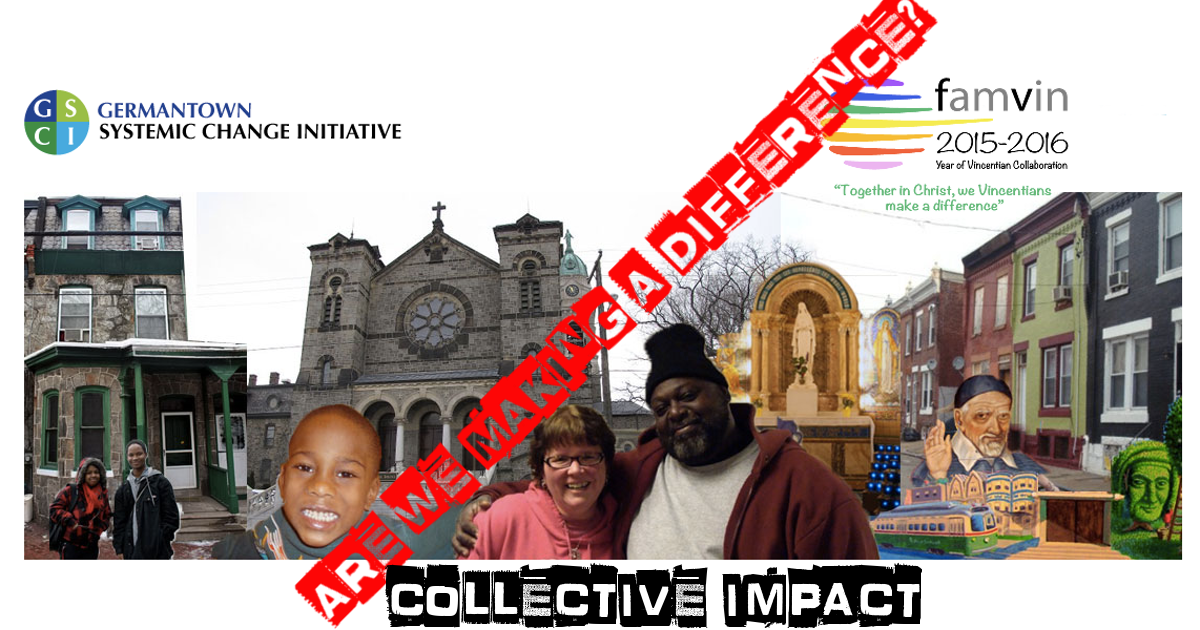
by Mike Clark
In providing services and programs to assist those in poverty, there are several basic questions we need to ask ourselves to determine whether or not what we are doing is making a difference. Namely:
How much did we do?
How well did we do it?
Is anyone better off?
I would venture to guess that we are very good at answering the first question, and have a bit more difficult of a time answering the second and third. We have become relatively proficient at measuring the number of people served, meals delivered, clothing disbursed, trainings delivered, and volunteer hours completed. But how do we measure and evaluate how well we deliver services, and ultimately if our programs/projects have made a difference?
I wrote earlier about collective impact, a model based on broad cross-sector collaboration that aims at addressing intractable social problems. This is one way to approach systemic change, and requires us to peak up from our own silos to see who else with which we can partner, align, and collaborate in a measurable, data-driven manner.
However, before we can run, we need to be able to walk (or even crawl). This requires a hard, internal look at our own projects/programs/organizations to determine answers to those three basic questions:
How much did we do?
How well did we do it?
Is anyone better off?
In my last post, I mentioned two frameworks that can help begin to answer those questions: a Theory of Change and a Logic Model. Another great tool to answer these specific questions is Results Based Accountability (RBA): http://raguide.org/index-of-questions/
In implementing the Collective Impact model in the Germantown section of Philadelphia, we realized that one of the essential steps is creating a Shared Measurement System (SMS), or a central online database that houses all of the social impact data from community collaborators, organizations, and programs. We realized pretty early that before we could attempt to create a Shared Measurement System, we had to figure out how organizations in the community were measuring their programs in the first place. RBA and its online database, Results Scorecard: http://resultsscorecard.com/ provided a great walk-through tool to help measure performance in areas such as academic achievement, adult employment, and health management.
The trick in achieving collective impact is being able to align what is making a difference in your individual program/project/organization with the other organizations to reach a scale that it creates a measurable impact on the population. For example, if you have a program that is successful at finding jobs for hard-to-employ adults, you can answer how well your services are being delivered and if anyone is better off rather easily. However, you could run an extremely successful program and not make a dent in unemployment at the community level, where conditions remain the same. In order to achieve that collective impact, we have to move out of our program silos and collaborate, align, and reinforce. But before we can run towards this promising model, we have to be able to crawl by answering:
How much did we do?
How well did we do it?
Is anyone better off?
 Mike Clark is the Executive Director of the Impact Germantown, a collective impact venture championed by the Vincentian Family in Philadelphia. Mike has advised faith-based communities in the areas of performance management, impact measurement, and impact investing. He has also developed social-innovation finance legislation for the state of New Jersey. Prior to his current role, he worked in a variety of roles in K-12 urban education in Philadelphia including strategy, resource development, and teaching. Michael also served as a Peace Corps volunteer in Bulgaria. He holds a Bachelors degree from the University of Scranton, and a Master of Public Administration from the University of Pennsylvania’s Fels Institute of Government.
Mike Clark is the Executive Director of the Impact Germantown, a collective impact venture championed by the Vincentian Family in Philadelphia. Mike has advised faith-based communities in the areas of performance management, impact measurement, and impact investing. He has also developed social-innovation finance legislation for the state of New Jersey. Prior to his current role, he worked in a variety of roles in K-12 urban education in Philadelphia including strategy, resource development, and teaching. Michael also served as a Peace Corps volunteer in Bulgaria. He holds a Bachelors degree from the University of Scranton, and a Master of Public Administration from the University of Pennsylvania’s Fels Institute of Government.
(Ed.: This developing project is a good one to watch and from which to learn. .famvin is watching and learning!)







Hi Mike – thank you for an excellent post! It is wonderful to read about initiatives like yours happening in my home state!
If you are interested in the intersectionality of Results-Based Accountability and Collective Impact, Results Leadership Group is actually hosting a weekly webinar series on the topic. This week’s webinar deals specifically with “reinforcing activities.” The next two will be on continuous communication and backbone support organizations.
Check it out if you’re interested: https://attendee.gotowebinar.com/register/2798200289933463810